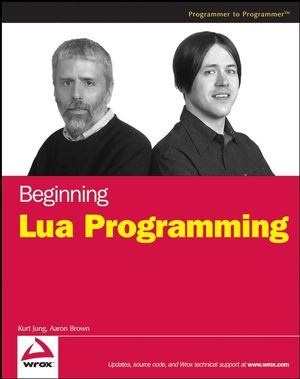Beginning Lua ProgrammingISBN: 978-0-470-06917-2
Paperback
672 pages
February 2007
 This title is out-of-print and not currently available for purchase from this site.
|
Introduction.
Chapter 1: Getting Situated.
Choosing How to Install Lua.
Finding Your System’s Shell.
Dealing with Tarballs and Zip Files.
Compiling Lua.
Binary Packages.
Additional Tools.
Chapter 2: First Steps.
Numbers and Arithmetic Operations: Basic Interpreter Usage.
Interpreter Know-How.
Numerical Gotchas.
Variables and Assignment.
Strings.
Relational Operators and Boolean Values.
The nil Value.
Boolean Operators.
The Concatenation, Length, and Modulo Operators.
Automatic Conversion of Operands.
Precedence and Associativity.
Variables and Values.
Comments.
Expressions and Statements.
Compound Statements.
Chapter 3: Extending Lua with Functions.
Return Values.
Chunks as Functions.
Variable Scope.
Understanding Side Effects.
Functions Calling Functions.
Functions as Values.
Whitespace, Semicolons, and Function Calls.
Upvalues and Closures.
Chapter 4: Working with Tables.
Tables Introduced.
A Shorter Way to Write Some Keys.
Altering a Table’s Contents.
Tables as Arrays.
Array Length.
Looping through Tables.
Tables of Functions.
Functions with Variable Numbers of Arguments.
Keyword Arguments.
Different but the Same.
Building Other Data Structures from Tables.
Custom-Made Loops.
Global Variable Environments.
Chapter 5: Using Strings.
Basic String Conversion Functions
String Length.
Converting Between Characters and Character Codes.
Formatting Strings and Numbers with string.format.
Input/Output.
Pattern-Matching.
Chapter 6: Handling and Avoiding Errors.
Kinds of Errors.
Handling Errors.
Locating Errors.
Chapter 7: Using Modules.
Interfaces and Implementations.
The require Function.
Where to Put Modules.
Preserving a Module’s Interface.
Module Bookkeeping.
Bytecode.
Namespaces.
The module Function.
C Modules.
Chapter 8: Extending Lua’s Behavior with Metamethods.
Using Concatenation and Arithmetical Operators on Tables.
Relational Metamethods.
Indexing and Call Metamethods.
Non-Tables with Metamethods.
Non-Syntactical Metamethods.
Metamethod Applicability.
Chapter 9: Handling Events Naturally with Coroutines.
Coroutines and Program Control.
Managing Concurrent Tasks.
Retaining State.
Handling Events Simply.
Chapter 10: Looking Under the Hood.
Bytecode and luac.
Garbage Collection.
The Implementation of Tables and Strings.
The Debug Library.
Chapter 11: Exploring Lua’s Libraries.
Core Library.
Coroutine Library.
Package Library.
String Library.
Table Library.
Math Library.
Input/Output Library.
Operating System Library.
Debugging Library.
Chapter 12: Using Community Libraries.
Library Overview.
How Lua Interacts with Libraries.
The pack Binary Structuring Library.
The cURL File Transfer Library.
The gd Graphics Library.
The SQLite Database Library.
Chapter 13: Interfacing Lua with Other Languages.
How C Programs Use Lua.
Communicating Between Lua and C.
Calling Lua from C.
Working with Userdata.
Indexing Values in C.
Retaining Values in C.
Layering Your Extension Library.
Chapter 14: Managing Information with Databases.
Some Basic Relational Database Concepts.
SQL, LuaSQL, and MySQL.
Chapter 15: Programming for the Web.
A Web Server Primer.
Dynamic Web Content.
Executing CGI Scripts.
Installing a Web Server.
Testing Your Web Server with Static Content.
Serving Dynamic Web Content.
Interactive CGI Applications.
The Kepler Project.
Chapter 16: Connecting to a Larger World.
Installing LuaSocket.
Network Overview.
Using LuaSocket for Network Communication.
Handling Multiple Persistent Connections.
The Application Protocols.
Networking with Lua and Streams.
Chapter 17: Programming Games with Lua.
Understanding Why and When to Use Lua.
Simple 2-D Action Game Using SDL.
Chapter 18: Carrying Lua with You.
Getting Started with Plua.
Exploring Plua’s Features.
Plua on the Mothership.
Programming with Plua.
Chapter 19: Fitting into the Lua Community.
The Lua Web Site.
The Lua Reference Manual.
Framing Questions.
The Lua Mailing List.
The Lua Chat Room.
Forums.
The Lua Wiki.
LuaForge.
Annual Workshops.
Appendix A: Answers.
Index.



